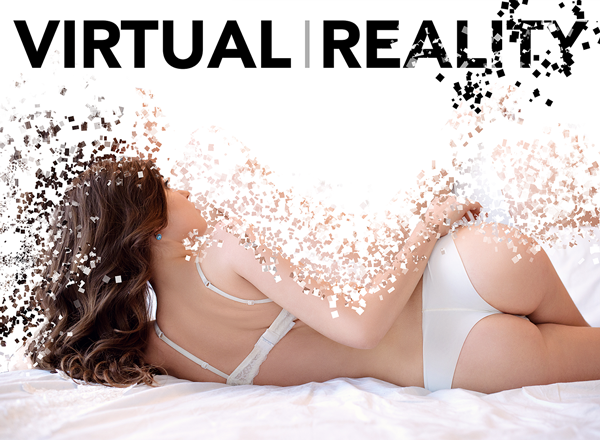VR Porn: Where do the Lines of Virtual and Reality Blur?

VR or Virtual Reality is a fast growing market, quickly approaching $7.9B as an industry. Much of its popularity is thanks to the gaming industry, but as always, with any new visual technology, the adult film industry has been an early adopter. Not only has VR porn become a new and interesting way of reaching a whole new audience like never before, it’s also coming with some serious ethical baggage. Imagine being able to reach out and virtually interact with your favorite adult film star, or even your favorite cartoon character– no judgment, Lola Bunny is pretty hot!
How would that change our views on porn, relationships, and identity?
Those questions might be benign– maybe you’d think more often “Hey I can just stay in tonight and jack it to Faye Reagan in VR!” and to many that wouldn’t deviate too far from their normal routine– you’re just opting out 2D for 3D. But what happens then when budding VR technology meets the ever growing problem of deep fakes? A deep fake is a very convincing fictional likeness of someone. For example, with face mapping technology you can project any celebrity or politician’s face over a model in real time, making the resulting video footage look genuine– think FaceSwap but more disturbingly real. Aside from the implications of government agencies using this technology to incriminate anyone they don’t agree with, the implications for VR porn are just as disturbing. How would you feel if you found out that creepy person at work took a bunch of your Facebook photos and effectively mapped your face well enough that they could enjoy a deep fake of you living out their wildest fantasies in VR? I imagine it would feel pretty violating. Don’t take my word for it, read this disturbing account.
A Lawful Line
With any new technology, legislation is the last thing to catch up, and even then the laws are bandaids at best, woefully misinformed at worst. Don’t get me wrong, I’m not asking the VR industry to grind to halt, but with any kind of porn the issue of exploitation and consent comes up again and again. Is it illegal right now to create a deep fake porn of someone who didn’t consent to it? Depends on where you live, and it's so shockingly common that it makes those few laws against it hard to enforce. Is it morally wrong– well that’s more of a grey area for some, in my opinion if no consent was sought, it's absolutely morally wrong. Many wouldn’t bat an eye about a fictional erotic story in which the author had a torrid affair with their favorite celebrity. But therein lies the problem, with the medium of text or even traditional art, we inherently understand where the boundaries of reality and fiction lie. With a faked pornographic video or even photo, the lines between fact and fiction become much, much blurrier the more photorealistic technology becomes– VR especially.
But What About Sex Workers?
Another set of concerns that pop up with new technology is how said technology will impact the job market. If you can rip popular porn star or celebrity's likenesses freely off the internet and create your own wholly original scenarios for personal enjoyment or even profit, would that put adult film actors out of business and mainstream actors' reputations at risk? for certain, it's a hard pill to swallow when your likeness is being used for profit without your participation.
Victimless Crime?
The question of who consumes it and for what purposes also complicates this matter further. Aside from the questions above, some of the more taboo and fringe corners of the internet are using this technology to act out morally reprehensible fantasies, virtually. If there was no physically real victim, was there even a crime? Or could this technology possibly be used to keep offenders from hurting a real victim, in favor of acting out their desires on a digital avatar. These are some of the more concerning questions popping up with no clear answers.
Poses A Privacy Risk
In an age where nudes have become a commodity and unfortunately in a lot of cases, a form of extortion, this technology would be no different or any less ubiquitous. It is naive to think that we should and would stop taking selfies or even nudes, but we need to be wary of assuming that our digital likenesses are safe. Quickly growing technologies and quickly evaporating personal privacy means it’s getting harder to police the content being created and swapped on the web. Much like a game of whac-a-mole, one digital crime is stamped out and a thousand more appear on a vast and ever expanding online landscape.I don't condemn VR technology's use in the porn industry, in fact I think it's an amazing and novel way to interact with adult content! I'm all for giving it a try! With every new technology, there will be both positives and negatives, it's just a matter of how we use the technology. Much the same way I love the internet as a tool for connecting people to each other and knowledge, but I also recognize how it can be a tool for all kinds of problematic activities. I do, however, definitely condemn any activity that makes someone feel violated.
I don’t have an answer as to how we would combat these problems or how we could ensure potential victims could see justice. On a positive note, some states like California are paying attention and passing anti deep fake laws, but like anything, people will find ways to circumvent them. One thing I know for certain is that we have been grappling with the same questions from the moment we could capture a person’s likeness.
~ Emily Biermann
Graphic Designer & Contributor for TooTimid.com











Leave a comment